Table of Contents[Hide][Show]
- Nutrivore Score for Edamame – 359
- Edamame Nutrition Facts
- Edamame Nutrition Varies With Cooking and Maturation
- Soybean Nutrition Varies With Processing
Health Benefits of Edamame Nutrients+−
- Edamame Provides 138% DV Vitamin B7 (Biotin)
- Edamame Provides 53% DV Vitamin B9 (Folate)
- Edamame Provides 46% DV Vitamin B1 (Thiamin)
- Edamame Provides 41% DV Vitamin C
- Edamame Provides 2.4 mg of CoQ10
- Edamame Provides 323.2 mg of Polyphenols
- Edamame Provides 16.6 g of Protein
- Edamame Provides 30% DV Alpha-linolenic Acid (ALA)
- Edamame Provides 30% DV Manganese
- Edamame Provides 25% DV Iron
- Edamame Provides 21% DV Linoleic Acid
- Edamame Provides 20% DV Magnesium
- Edamame Provides 20% DV Phosphorus
- How Much Edamame Should We Eat Per Day?
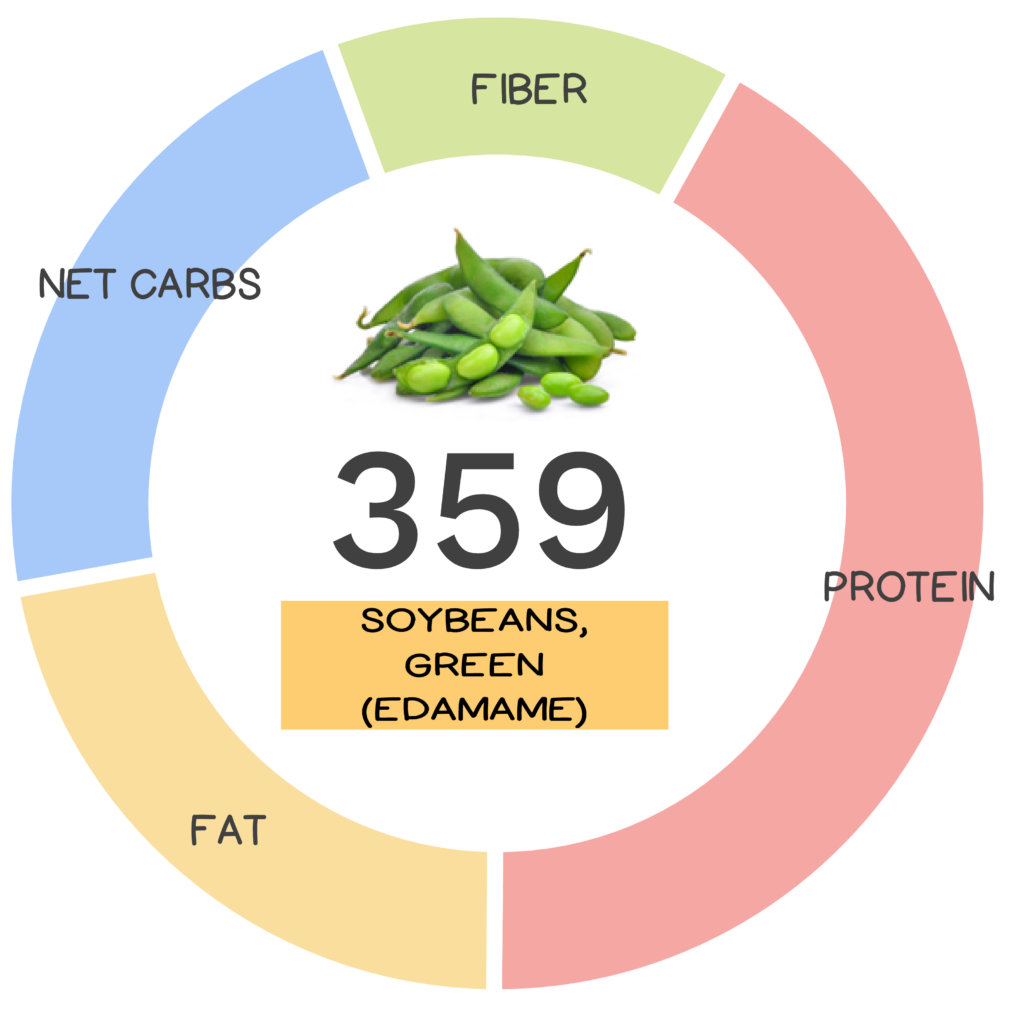
Edamame is the name given to a Japanese dish made from immature soybeans that are served in the pod. In Japanese, the name edamame means “stem beans”, which was denoted because they were often sold while still attached to the plant’s stem. Edamame beans that are extracted and served outside the pod are also sometimes called mukimame.
Soybeans were first grown in China over 7000 years ago, but the first time edamame appeared in records was in the year 1275. Edamame is used in many East Asian cuisines and has also gained popularity in Western countries, and as a result is widely consumed all over the globe. The green soybeans are harvested when they are immature, and as a result are sweeter than fully ripened soybeans.
Edamame are harvested from the soy plant before they are fully ripened, which makes them much sweeter than the ripe, pulse soybean variety.
Legumes might not be the most fancy, flashy, or exciting foods out there, but don’t let their humble looks deceive you: this food group is a health-boosting powerhouse! And did you know this food family has a secret power – they can actually make music?! You know…”beans, beans, the musical fruit…”
Legumes are the fruit or seed of plants from the Fabaceae (also called Leguminosae) family, which includes members such as beans, lentils, peas, and peanuts. And while technically, the food family includes immature versions of some beans such as edamame and edible podded peas, those green versions are often lumped with vegetables. Therefore, legumes are generally regarded as pulses—the starchy, dried seeds of legume plants.
Legumes were an important staple food for numerous ancient cultures, and every major civilization has included a legume as part of their food system. Over time, legumes became the centerpiece of a number of iconic national dishes through the Middle East, India, Brazil, Greece, Egypt and many more!
Legumes have been, and are to this day, an important staple food for every major civilization in history!
Along with having a long shelf life and extreme versatility, legumes are a very sneaky way to enhancing the nutrient density of meals as they are among the most nutrient-dense starchy plant foods available. They’re rich in phytonutrients, bioactive peptides, essential micronutrients including a large list of minerals, and resistant starch (a form of fiber)—all of which contribute to their wide-ranging health effects.
Edamame can be used in both savory and sweet dishes but is often consumed as a side dish or appetizer at Japanese restaurants. Pods are usually boiled or steamed before serving, and can be served with only salt, or a variety of sauces and condiments. When consuming podded edamame, they are most often pulled out of the shell by sliding each bean out with teeth or fingers into the mouth and the pods (or shells) are then discarded.
Learn What Foods to *ADD* to Your Diet
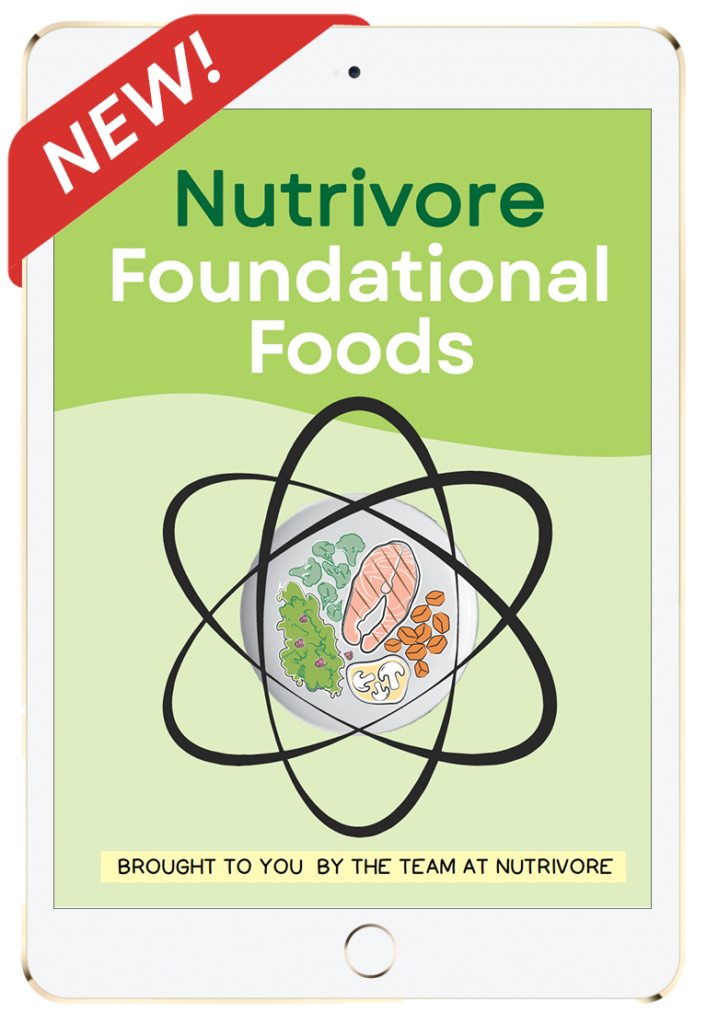
Nutrivore Foundational Foods
Learn what makes the 12 Nutrivore foundational food families nutritionally unique, their health benefits, which options are the most nutrient dense, how much of them to eat, plus various fun facts, practical pointers, and busting of common myths.
This very helpful resource will introduce you to new foods and expand your nutrition knowledge, making food choices easier!
Buy now for instant digital access.
Nutrivore Score for Edamame – 359
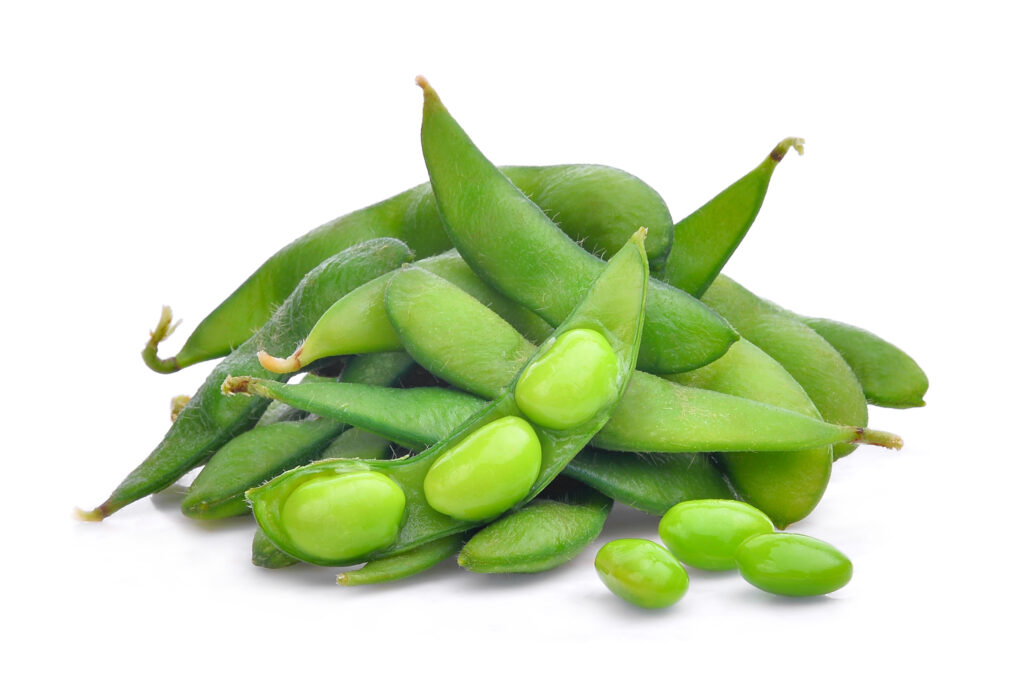
Edamame has a Nutrivore Score of 359, making it a medium nutrient-dense food!
Per serving, edamame is a best source (>50% daily value) of vitamin B7 (biotin), and vitamin B9 (folate); an excellent source (20-50% daily value) of alpha-linolenic acid (ALA), coQ10, iron, linoleic acid, magnesium, manganese, phosphorus, polyphenols, protein, vitamin B1 (thiamin), and vitamin C; and a good source (10-20% daily value) of calcium, copper, dietary fiber, potassium, vitamin B2 (riboflavin), and vitamin B3 (niacin), and zinc.
Ditch Diets. Embrace Nutrients. Start with this FREE Guide.
Sign up for the free Nutrivore Newsletter, your weekly, science-backed guide to improving health through nutrient-rich foods — without dieting harder —and get the Beginner’s Guide to Nutrivore delivered straight to your inbox!

Edamame Nutrition Facts
One serving of edamame is standardized to 1/2 cup raw or about 128 grams (4.5 ounces). When you cook edamame, the volume remains relatively consistent: 1 cup raw edamame is roughly equivalent to 1 cup cooked edamame.
Edamame Nutrition Facts Per Serving
| Edamame, raw | Nutrivore Score: 359 | Nutrient Density: Medium |
|---|---|---|
| Serving Size: 1/2 cup raw or 1/2 cup cooked | Protein: 16.6 grams | Net Carbohydrates: 8.8 grams |
| Calories: 188 | Total Fat: 8.7 grams | Dietary Fiber: 5.4 grams |
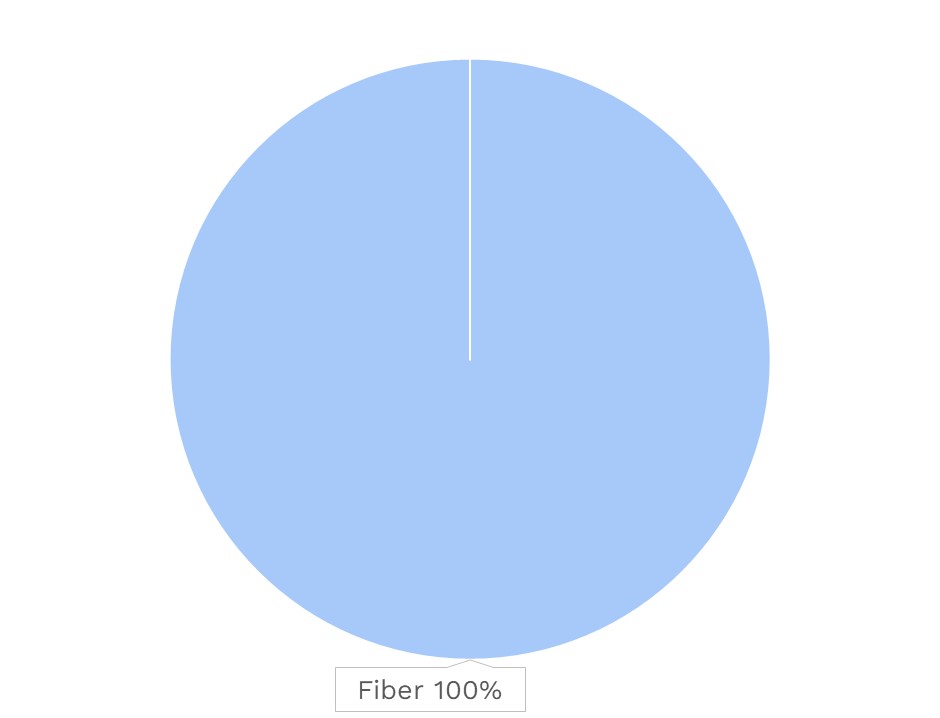
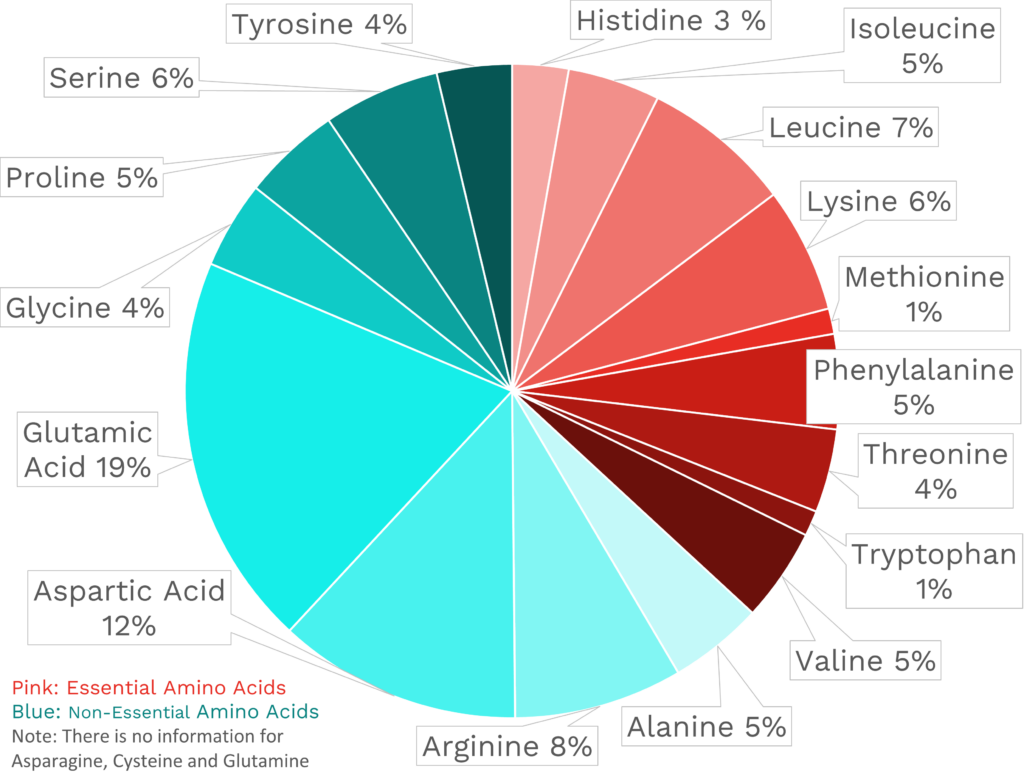
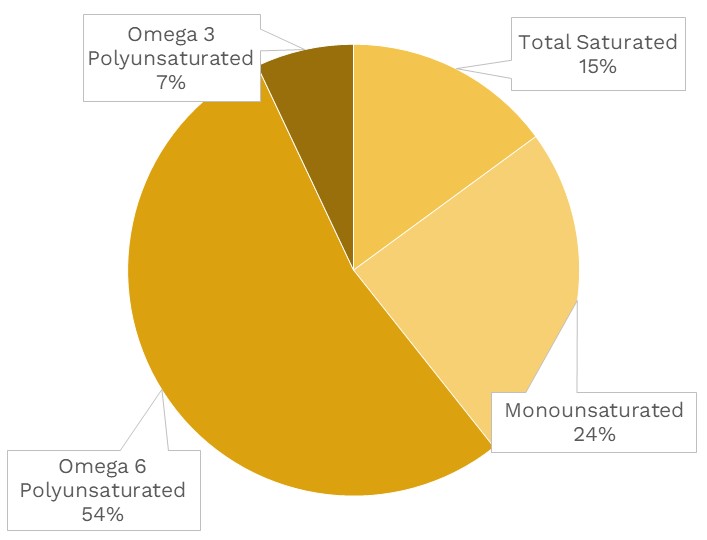
| VITAMINS | ||
|---|---|---|
| Vitamin A | 11.5 μg RAE | 1% DV |
| Vitamin B1 (Thiamin) | 556.8 μg | 46% DV |
| Vitamin B2 (Riboflavin) | 224.0 μg | 17% DV |
| Vitamin B3 (Niacin) | 2.1 mg | 13% DV |
| Vitamin B5 (Pantothenic Acid) | 0.2 mg | 4% DV |
| Vitamin B6 (Pyridoxine) | 83.2 μg | 5% DV |
| Vitamin B7 (Biotin) | 41.5 μg | 138% DV |
| Vitamin B9 (Folate) | 211.2 μg | 53% DV |
| Vitamin B12 (Cobalamin) | 0.0 μg | 0% DV |
| Vitamin C | 37.1 mg | 41% DV |
| Vitamin D (D2 + D3) | 0.0 μg | 0% DV |
| Vitamin E | ~ | ~ |
| Vitamin K | ~ | ~ |
| Choline | ~ | ~ |
| Myo-Inositol | 37.1 mg | ~ |
| CoQ10 | 2.4 mg | ~ |
| FUNCTIONAL FATS | ||
|---|---|---|
| MUFA | 1.6 g | 8% DV |
| ALA | 481.3 mg | 30% DV |
| EPA + DHA | 0.0 mg | 0% DV |
| CLA | ~ | ~ |
| Linoleic Acid | 3.6 g | 21% DV |
| MCT’s | ~ | ~ |
| MINERALS | ||
|---|---|---|
| Calcium | 252.2 mg | 19% DV |
| Copper | 163.8 μg | 18% DV |
| Iodine | ~ | ~ |
| Iron | 4.5 mg | 25% DV |
| Magnesium | 83.2 mg | 20% DV |
| Manganese | 700.2 μg | 30% DV |
| Phosphorus | 248.3 mg | 20% DV |
| Potassium | 793.6 mg | 17% DV |
| Selenium | 1.9 μg | 3% DV |
| Sodium | 19.2 mg | 1% DV |
| Zinc | 1.3 mg | 12% DV |
| PHYTONUTRIENTS | ||
|---|---|---|
| Carotenoids | ~ | ~ |
| Polyphenols | 323.2 mg | ~ |
| Phytosterols | 0.0 mg | ~ |
| Glucosinolates | ~ | ~ |
| Thiosulfinates | ~ | ~ |
| Betalains | ~ | ~ |
| AMINO ACIDS & PEPTIDES | ||
|---|---|---|
| Taurine | ~ | ~ |
| Ergothioneine | ~ | ~ |
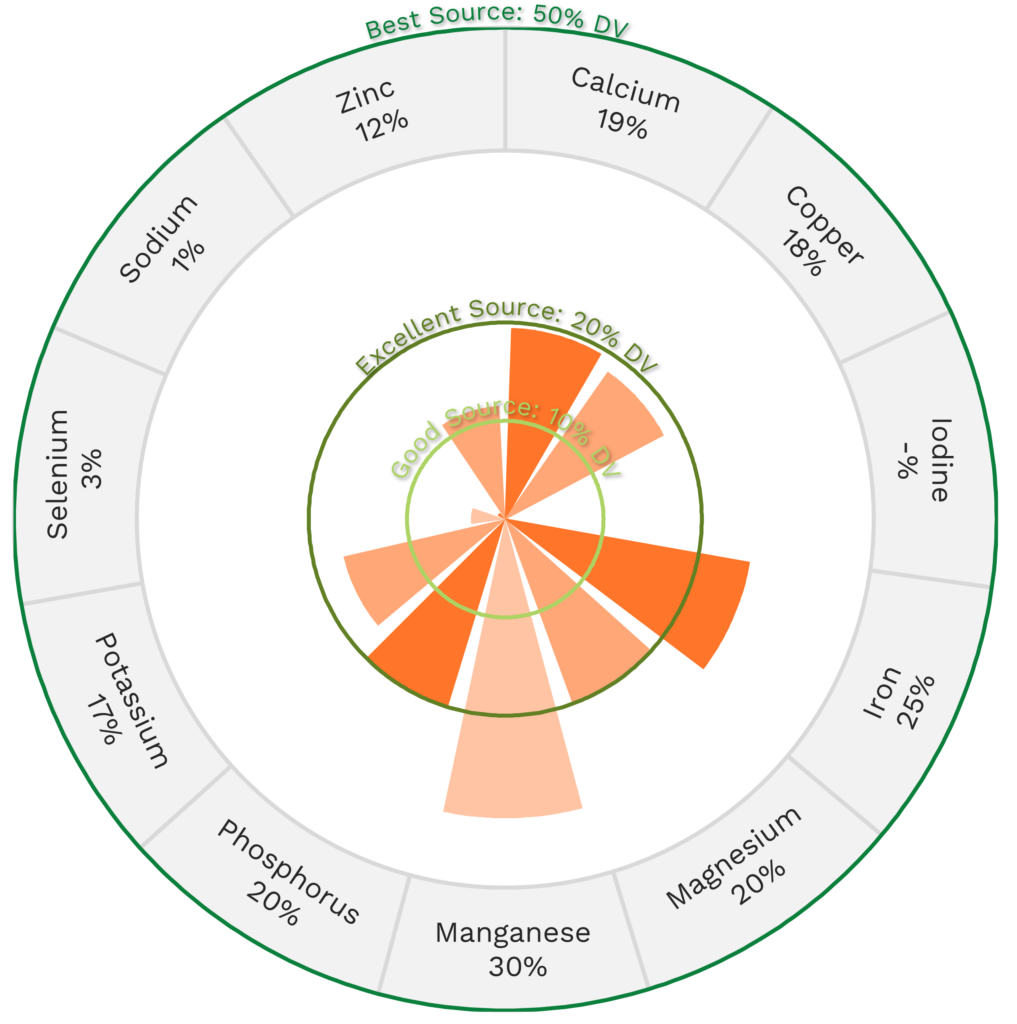
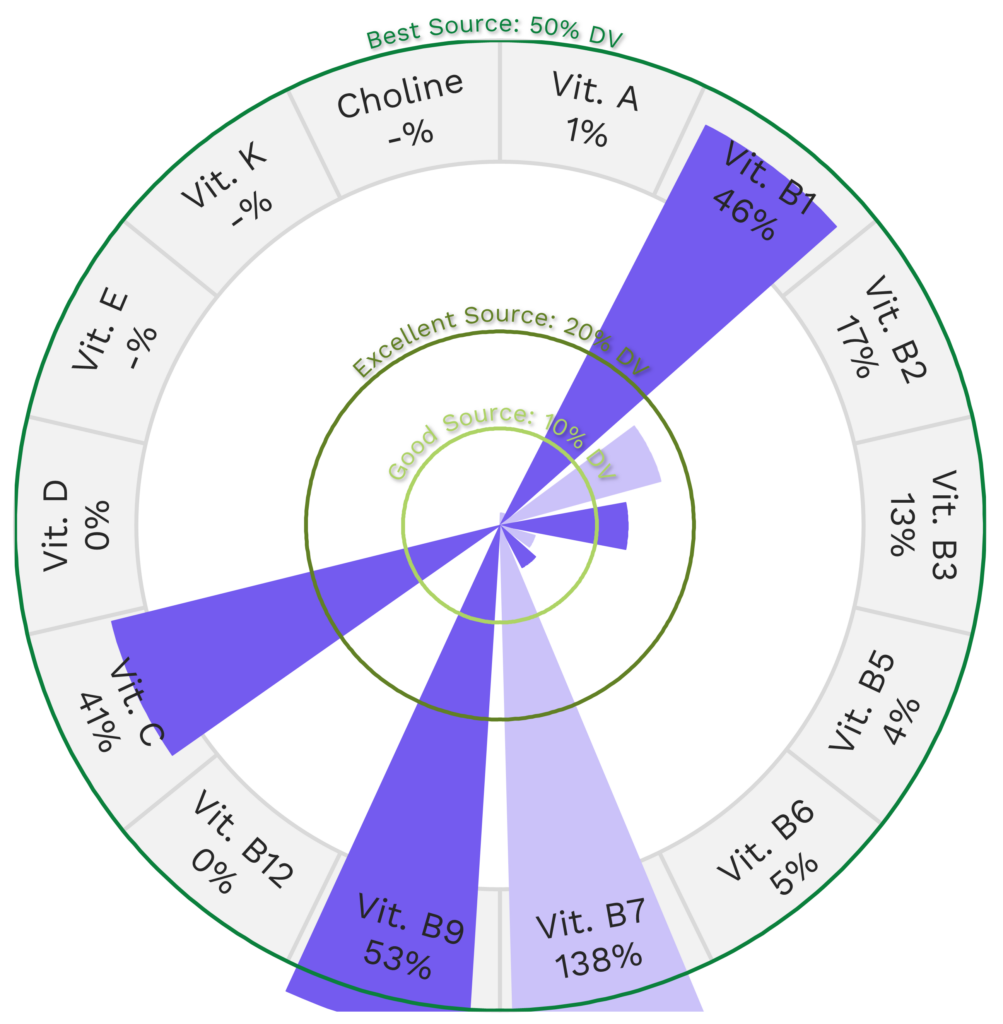
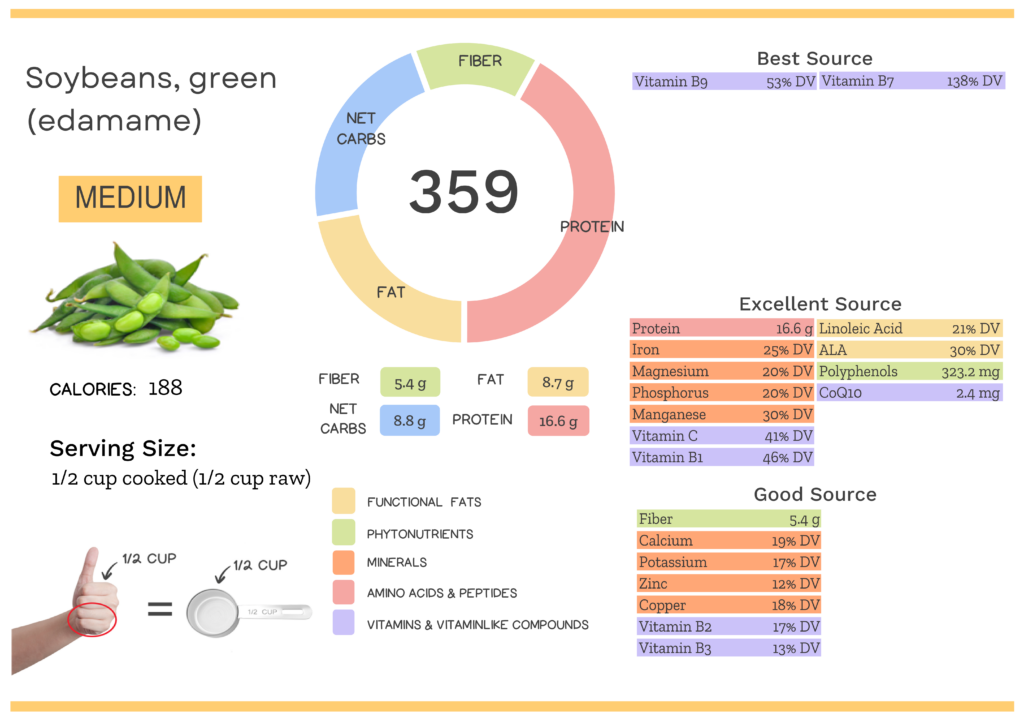
Edamame Nutrition Varies With Cooking and Maturation
The Nutrivore Score of edamame varies based on when it is harvested and method of preparation. Edamame (aka green soybeans) are the immature version of soybeans, while mature soybeans are the dried version of this legume.
| NUTRIVORE SCORE | |
|---|---|
| Edamame, (soybeans, green), cooked, boiled, drained, with salt | 3221 |
| Edamame, (soybeans, green), cooked, boiled, drained, without salt | 3221 |
| Edamame, (soybeans, green), frozen, prepared | 405 |
| Edamame, (soybeans, green), frozen, unprepared | 3932 |
| Edamame, (soybeans, green), raw | 3591 |
| Soybeans, mature seeds, raw | 326 |
Soybean Nutrition Varies With Processing
There are countless soybean products available on the market suited for different uses, ranging anywhere from beverages (soy milk) to condiments (soy sauce). Tofu is another soy product which is extremely popular in Asian and vegetarian cuisine. There are numerous types of tofu, ranging in firmness and flavor. In addition, there are various fermented soy products, such as miso, natto, and tempeh! Not only does each of these products have its own unique use-case, they also have differing flavors and nutrient profiles, which means their Nutrivore Scores also vary.
| NUTRIVORE SCORE | |
|---|---|
| Edamame, (soybeans, green), raw | 3591 |
| Miso | 1791 |
| Natto | 2561 |
| Soy flour, defatted | 3901 |
| Soy flour, full-fat, raw | 3261 |
| Soy meal, defatted, raw | 3182 |
| Soy milk, unsweetened, plain | 4251 |
| Soy sauce, made from hydrolyzed vegetable protein | 259 |
| Soy sauce, made from soy and wheat (shoyu) | 433 |
| Soy sauce, made from soy (tamari) | 373 |
| Soybean oil, refined | 160 |
| Soybean oil, salad or cooking | 186 |
| Soybeans, mature seeds, raw | 326 |
| Tempeh | 4381 |
| Tofu, dried-frozen (koyadofu) | 2541 |
| Tofu, dried-frozen (koyadofu), prepared with calcium sulfate | 2871 |
| Tofu, extra firm, prepared with nigari | 323 |
| Tofu, firm, prepared with calcium sulfate | 2931 |
| Tofu, firm, prepared with calcium sulfate and magnesium chloride (nigari) | 289 |
| Tofu, hard, prepared with nigari | 282 |
| Tofu, raw, regular, prepared with calcium sulfate | 339 |
| Tofu, salted and fermented (fuyu) | 295 |
| Tofu, salted and fermented (fuyu), prepared with calcium sulfate | 374 |
| Tofu, soft prepared with calcium sulfate and magnesium chloride (nigari) | 317 |
Surprised edamame is “soy” good for you? Maybe your friends will be too!
Health Benefits of Edamame Nutrients
Let’s take a closer look at all of the best and excellent source of nutrients found in a 1/2-cup serving of edamame and see how they benefit our health.
Edamame Provides 138% DV Vitamin B7 (Biotin)
Edamame is a best source of vitamin B7 (biotin), providing 138% of the daily value per 1/2-cup serving!
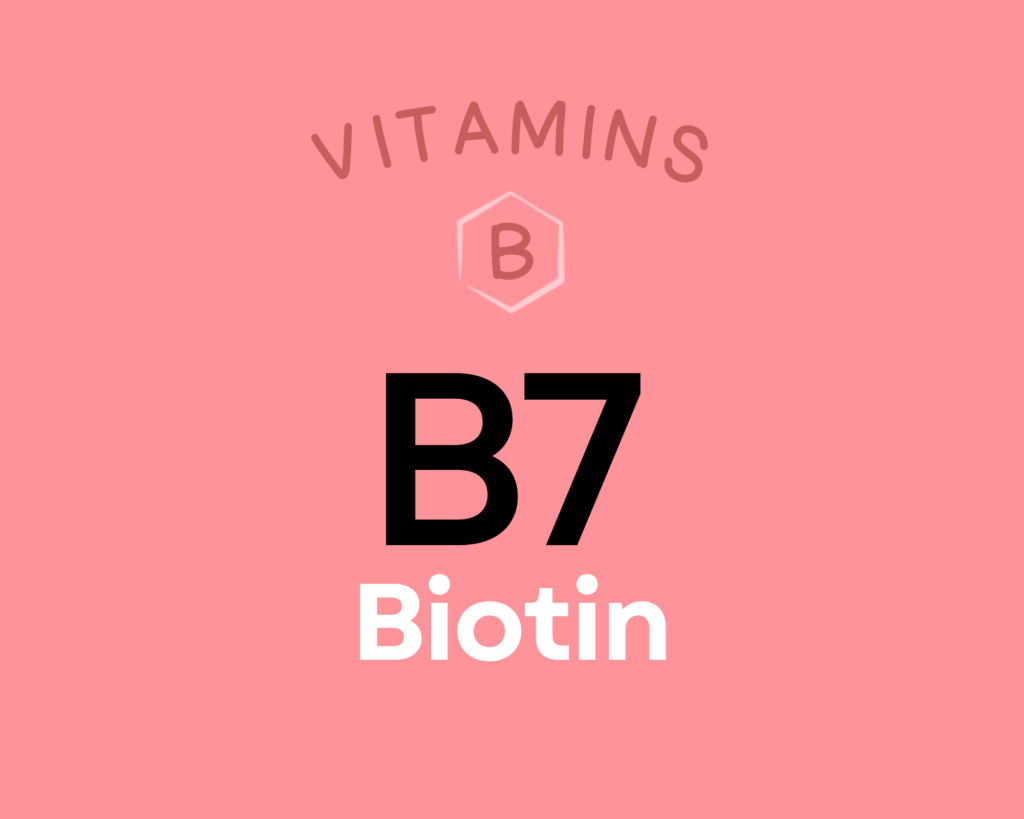
Biotin is a water-soluble B vitamin, also known as vitamin B7. Like other B vitamins, it plays an important role in energy metabolism (serving as a coenzyme for five carboxylase enzymes), neurotransmitter production, cellular function, and the function of various organs. Getting enough biotin can help support healthy nail and hair growth. It’s also particularly important during pregnancy, with low intakes increasing the risk of premature delivery and birth defects. There’s even some evidence biotin can benefit diabetics and reduce functional disabilities in people with multiple sclerosis. Learn more about biotin here.
Edamame Provides 53% DV Vitamin B9 (Folate)
Edamame is also a best source of vitamin B9 (folate), providing 53% of the daily value per 1/2-cup serving!
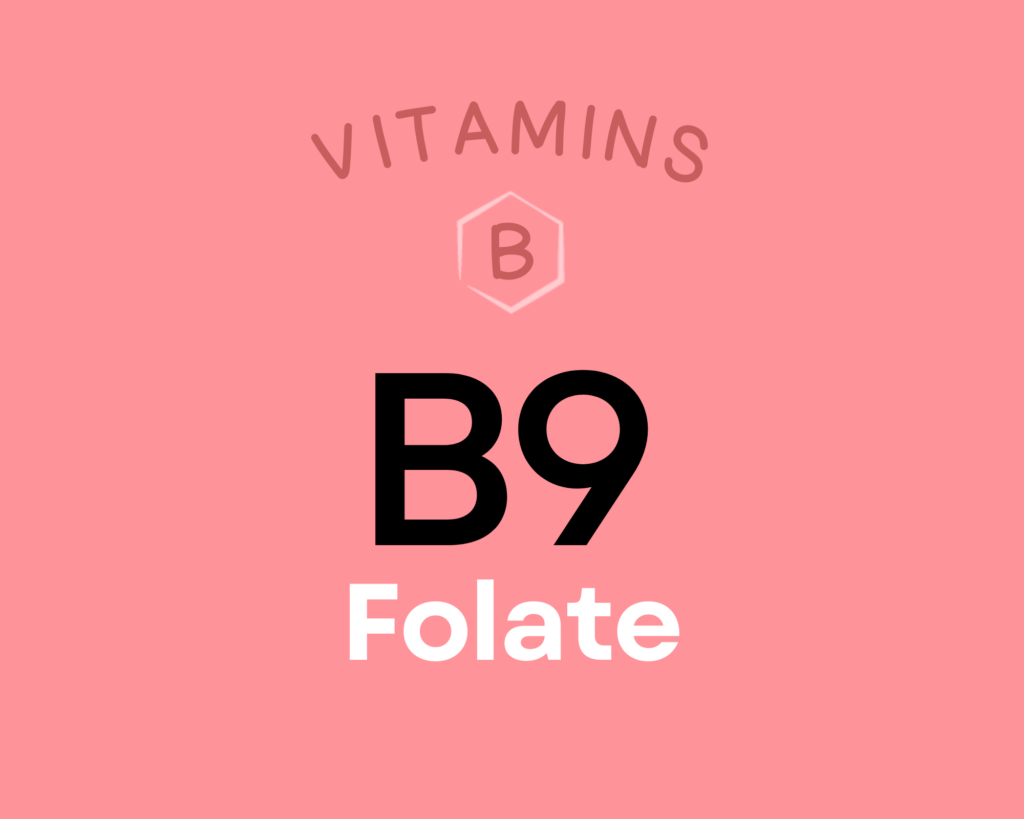
Vitamin B9 (folate) is an essential B vitamin that plays roles in blood cell production, the formation of genetic material (including DNA), and cell growth and function. It’s particularly important during pregnancy, when folate demands increase due to the rapid creation of new cells and DNA. Along with helping protect against fetal development problems, folate can support cardiovascular health, potentially protect against certain cancers, and reduce the risk of cognitive and neurological disorders later in life. Learn more about vitamin B9 here.
Edamame Provides 46% DV Vitamin B1 (Thiamin)
Edamame is an excellent source of vitamin B1 (thiamin), providing 46% of the daily value per 1/2-cup serving!
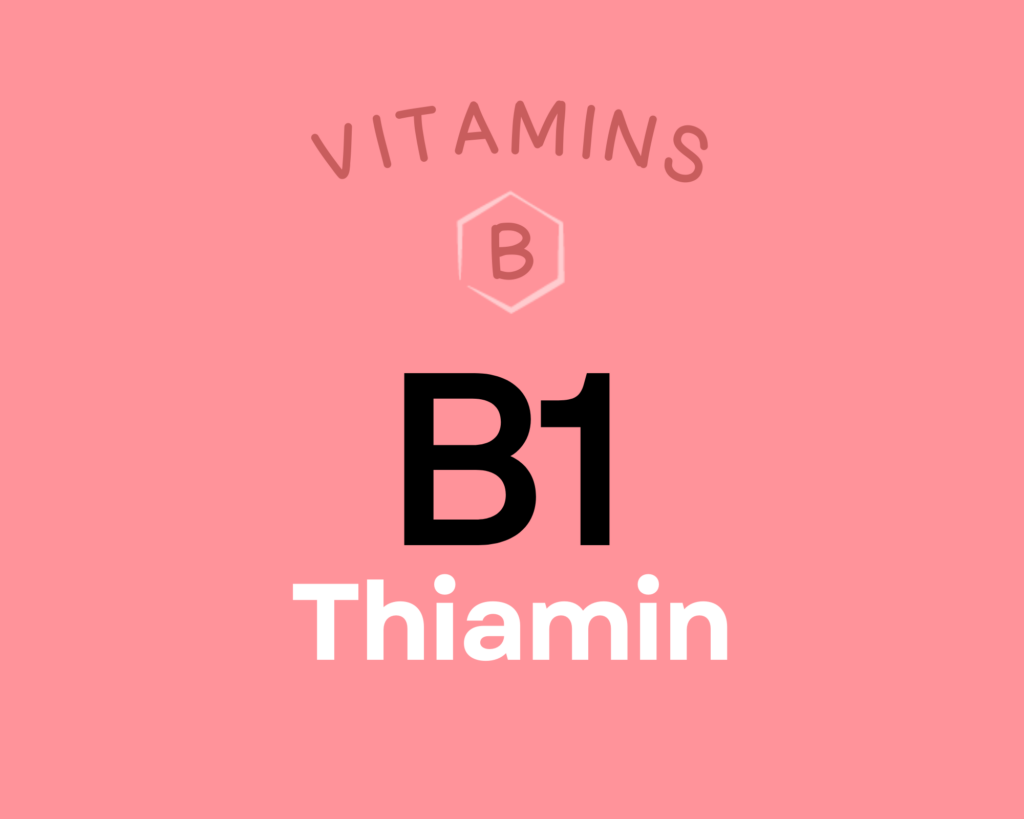
Thiamin (sometimes spelled thiamine, and also called vitamin B1) is a water-soluble vitamin. In its active form of thiamin pyrophosphate, it serves as a cofactor for a variety of enzymes involved in carbohydrate and amino acid metabolism, RNA and DNA production, and generating energy for the Krebs cycle. Research suggests vitamin B1 could help prevent blood sugar and insulin increases in people with disordered glucose metabolism, reduce the risk of cataracts, and improve health and mortality outcomes in patients with sepsis. Because aggressive tumors have high thiamin demands, it’s uncertain whether supplementing with thiamin while having cancer is beneficial due to preventing deficiency, or harmful due to providing more fuel for tumor growth. Insufficient thiamin may increase the risk of Alzheimer’s disease, and when chronic, leads to a deficiency disease called beriberi. Learn more about vitamin B1 here.
Edamame Provides 41% DV Vitamin C
Edamame is also an excellent source of vitamin C, providing 41% of the daily value per 1/2-cup serving!
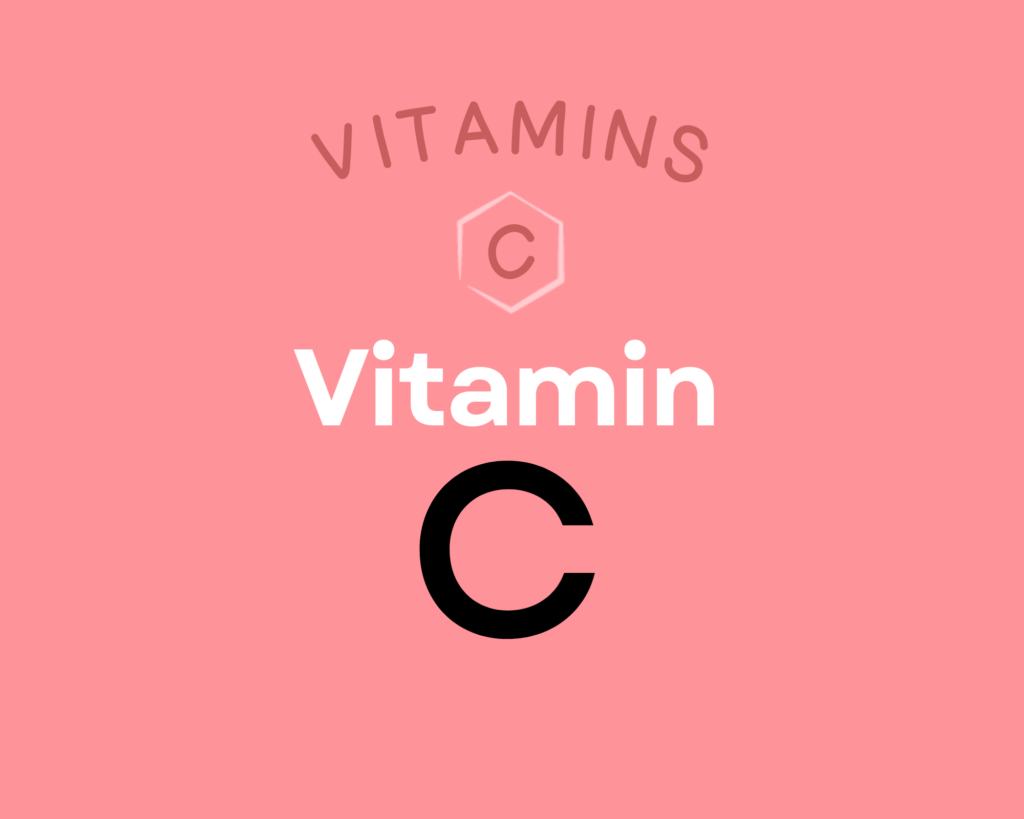
Vitamin C is a water-soluble vitamin that has powerful antioxidant properties (meaning it can help combat oxidative damage from free radicals and reactive oxygen species) and that serves as an enzyme cofactor (meaning it’s needed for enzymes to do their job, for example vitamin C is necessary for collagen synthesis, which is essential for bones, joints, teeth, blood vessels, skin and eyes) and playing important roles in immune system and skin health. Higher intakes of vitamin C are linked to reduced risk of heart disease, some forms of cancer, type 2 diabetes, cataracts, age-related macular degeneration, and gout. Vitamin C can also help regulate the stress response and reduce anxiety, and there’s preliminary evidence that it may also help prevent Alzheimer’s disease. Learn more about vitamin C here.
Edamame Provides 2.4 mg of CoQ10
Edamame is an excellent source of coQ10, providing 2.4 mg of coQ10 per 1/2-cup serving!
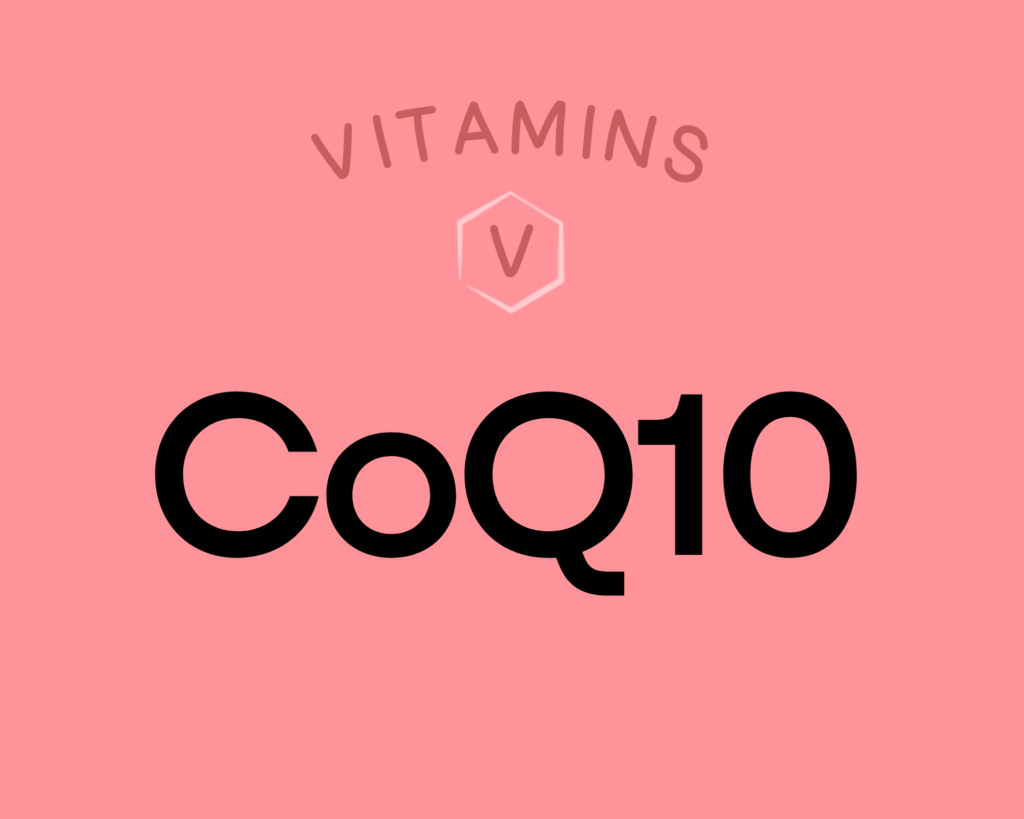
Ubiquinone is the oxidized form and ubiquinol is the reduced, more bioavailable form of the vitaminlike compound coenzyme Q10 (coQ10). CoQ10 is a potent antioxidant and a cofactor in the electron transport chain for the production of ATP. It may be helpful in treating or preventing heart and blood vessel conditions, diabetes, gum disease, muscular dystrophy, chronic fatigue syndrome, and breast cancer. Sources include beef, pork, mackerel, yellowtail fish, and chicken; it’s also found in smaller amounts in vegetables like broccoli and herbs like parsley. Learn more about coQ10 here.
Edamame Provides 323.2 mg of Polyphenols
Edamame is also an excellent source of polyphenols, providing 323.2 mg of polyphenols per 1/2-cup serving!
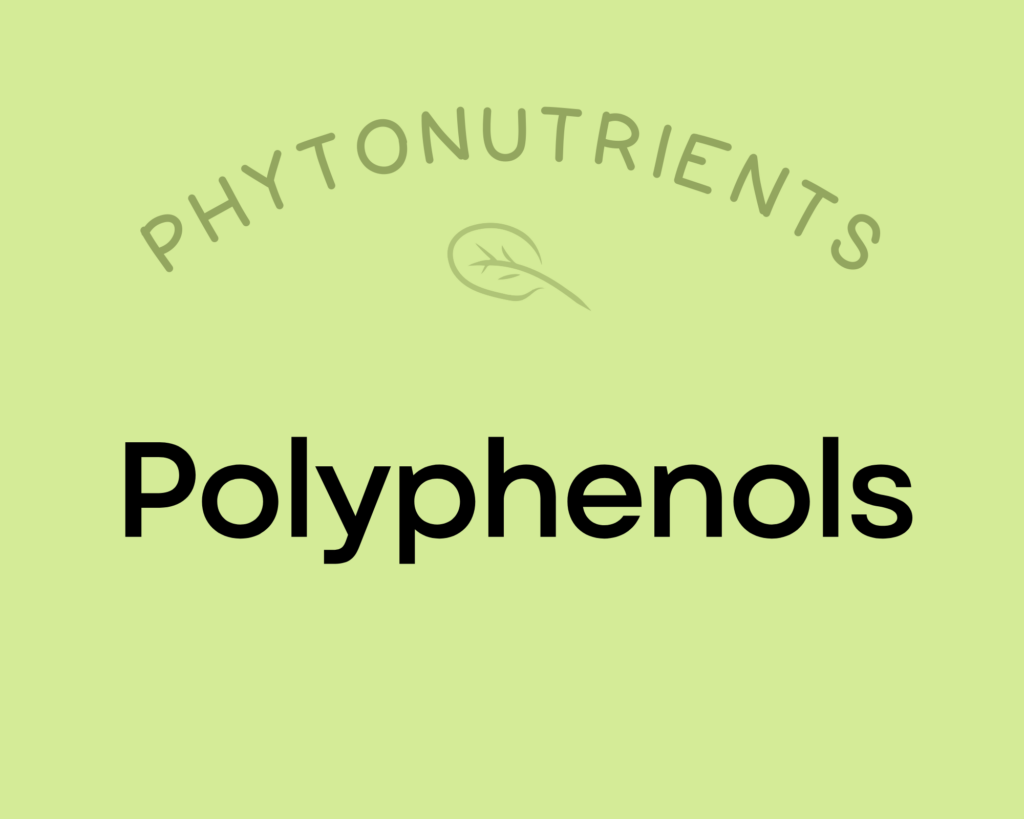
Polyphenols play a huge role in protecting against cancer, heart disease, diabetes, asthma, osteoporosis, neurodegenerative diseases, and other conditions associated with oxidative stress. In fact, a major reason foods like red wine and olive oil (as well as diets rich in both, such as the Mediterranean diet) show up as so beneficial may be due to their high polyphenol content! Along with chronic diseases, supplementing with polyphenols has been shown to protect against infections and reduce the signs of aging. Polyphenols exert their most potent effects by acting as antioxidants—preventing cellular damage by neutralizing hazardous oxygen radicals and improving cellular health as a result (which, in turn, benefits virtually every system in the body). As a result of their antioxidant properties, polyphenols also boost the immune system and protect against both chronic and acute diseases. In addition, polyphenols can help regulate enzyme function, stimulate cell receptors, modulate the functions of inflammatory cells (including T and B lymphocytes, macrophages, platelets, and natural killer cells), alter adhesion molecule expression, affect nerve cells and cardiac muscle cells, and exert antiviral effects. Learn more about polyphenols here.
Edamame Provides 16.6 g of Protein
Edamame is an excellent source of protein, providing 16.6 g of protein per 1/2-cup serving!
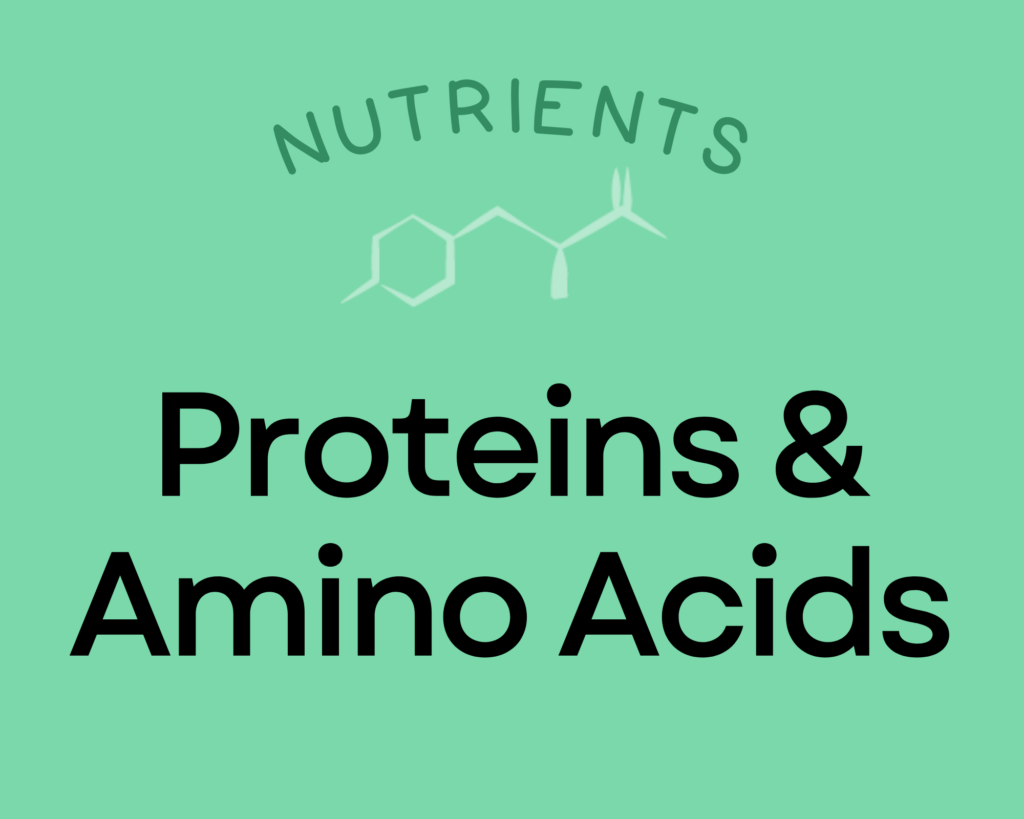
Proteins are the molecules that actually perform most of the various functions of life. In addition to being major structural components of cells and tissues, they have incredibly diverse roles from driving chemical reactions (e.g., enzymes) to signaling (e.g., some types of hormones) to transporting and storing nutrients. Dietary protein is necessary to supply the amino acid building blocks for all of the proteins in our bodies. The recommended daily allowance of protein is 0.36 grams per pound body weight (0.8 grams per kilogram of body weight). That amounts to 56 grams for a 150-pound person. However, it’s important to emphasize that this number is considered a minimum daily allotment, and there is no established upper limit. In fact, many studies have evaluated diets containing three to four times more protein than this minimum and proven benefits to weight management, body composition, hormone regulation, and cardiovascular health. These studies suggest that an optimal protein intake for most people is probably in the range of 1.2 to 1.8 grams per kilogram bodyweight (82 to 122 grams for that same 150-pound person), and that people who are very active may see the best results at even higher intake. Learn more about protein and amino acids here.
Edamame Provides 30% DV Alpha-linolenic Acid (ALA)
Edamame is also an excellent source of alpha-linolenic acid (ALA), providing 30% of the daily value per 1/2-cup serving!
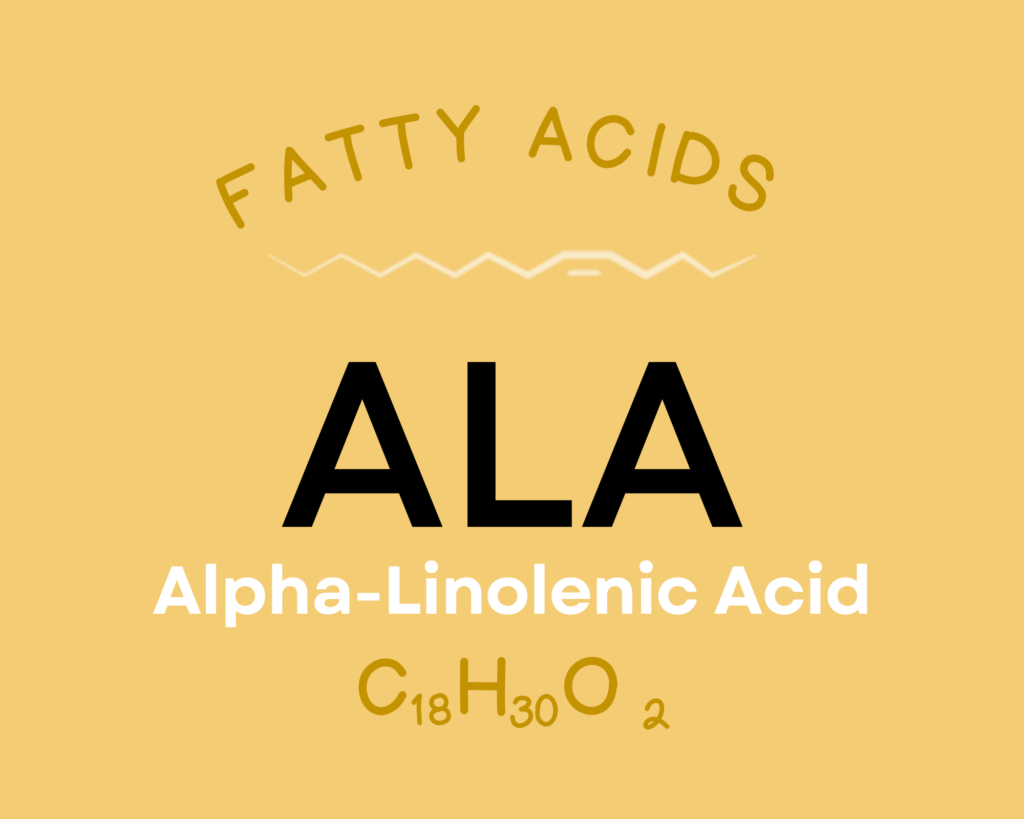
Alpha-linolenic acid (ALA) is the only truly essential omega-3 fatty acid. Like other omega-3 fats, it plays an important role in regulating inflammation, pain perception, and blood pressure. It’s also major structural component of the phospholipid layer of cell membranes. Getting enough ALA helps maintain cardiovascular health, while also potentially protecting against cancer, pneumonia, and some forms of depression. Learn more about ALA here.
Edamame Provides 30% DV Manganese
Edamame is an excellent source of manganese, providing 30% of the daily value per 1/2-cup serving!
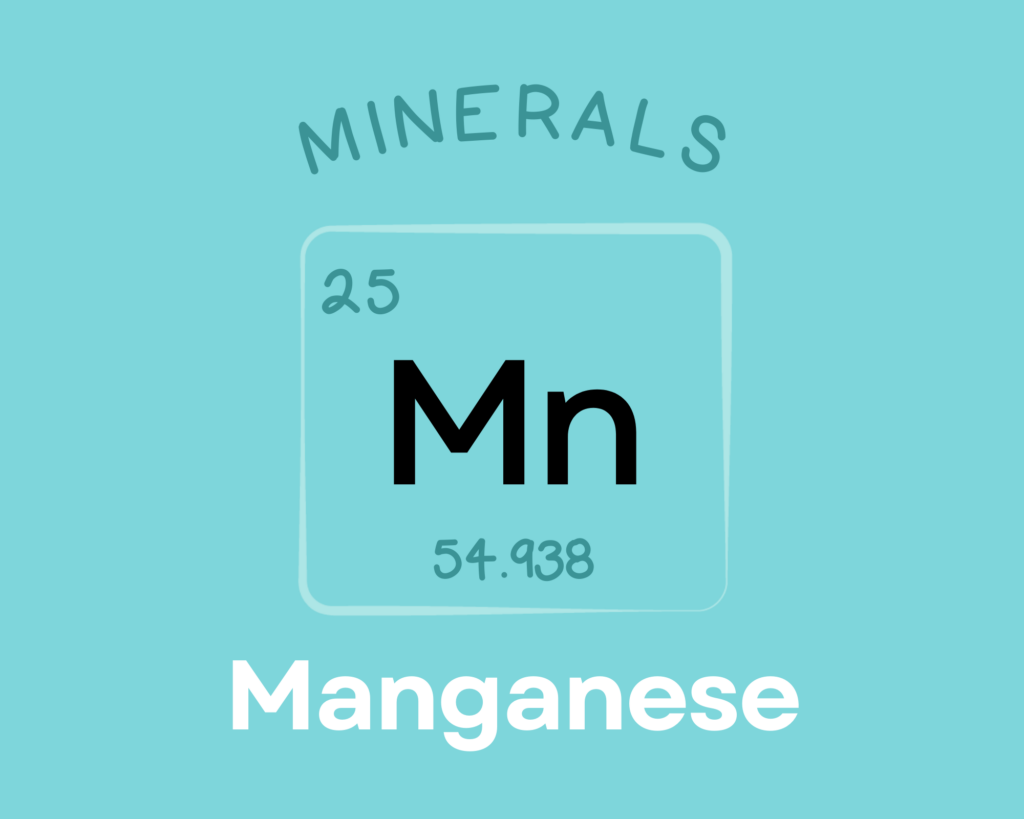
Manganese is an essential mineral that serves as a cofactor and component of numerous enzymes. Through these roles, it’s involved in carbohydrate metabolism, amino acid synthesis, gluconeogenesis, detoxification, lipid processing, free radical defense, bone and collagen formation, and wound healing. Although the research so far is limited, some evidence suggests that manganese can protect against osteoporosis and diabetes, and may even be involved in seizure disorders. Learn more about manganese here.
Edamame Provides 25% DV Iron
Edamame is also an excellent source of iron, providing 25% of the daily value per 1/2-cup serving!
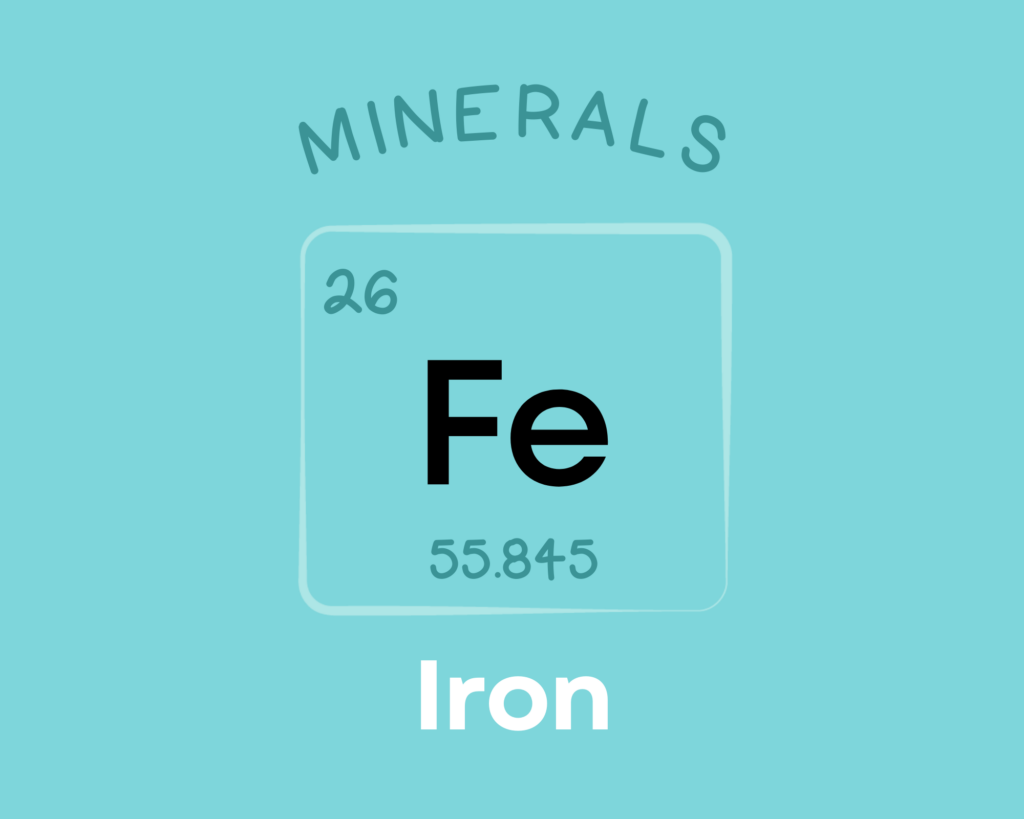
Iron is a mineral required for the metabolism of all living organisms. It’s needed for the function of numerous iron-dependent proteins involved in electron transport, energy metabolism, oxygen transport and storage, DNA replication and repair, free radical scavenging, and oxidative processes. It plays an important role in reproductive health, gestation, immunity, and central nervous system development. Learn more about iron here.
Edamame Provides 21% DV Linoleic Acid
Edamame is an excellent source of linoleic acid, providing 21% of the daily value per 1/2-cup serving!
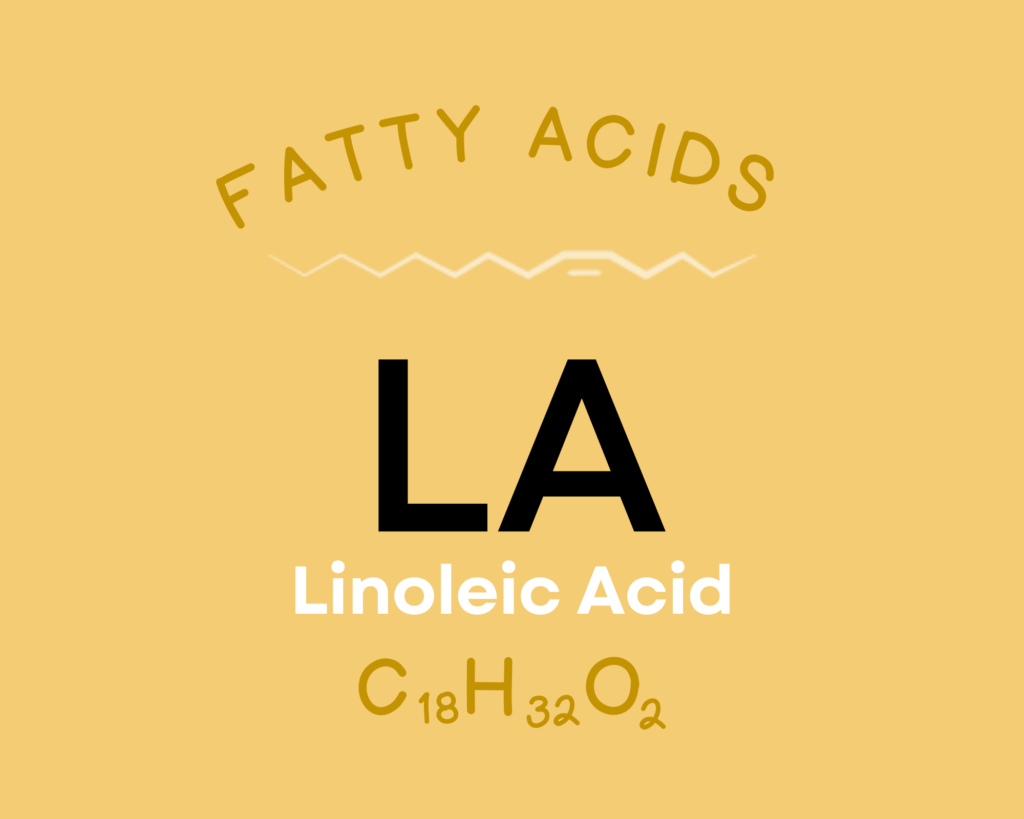
Linoleic acid is the only essential omega-6 fatty acid. Along with being required for human growth and development, it serves as a structural component of cell membranes, plays a role in maintaining skin health and integrity, and is a precursor for bioactive lipid mediators. Although linoleic acid can lower LDL cholesterol levels, research hasn’t consistently shown any protective effect against heart disease. Likewise, there’s mixed evidence (some showing benefit, some showing harm) for the effects of linoleic acid on cancer. Higher intakes have also been associated with depression and obesity, although it may have a protective effect against diabetes. Learn more here.
Edamame Provides 20% DV Magnesium
Edamame is also an excellent source of magnesium, providing 20% of the daily value per 1/2-cup serving!
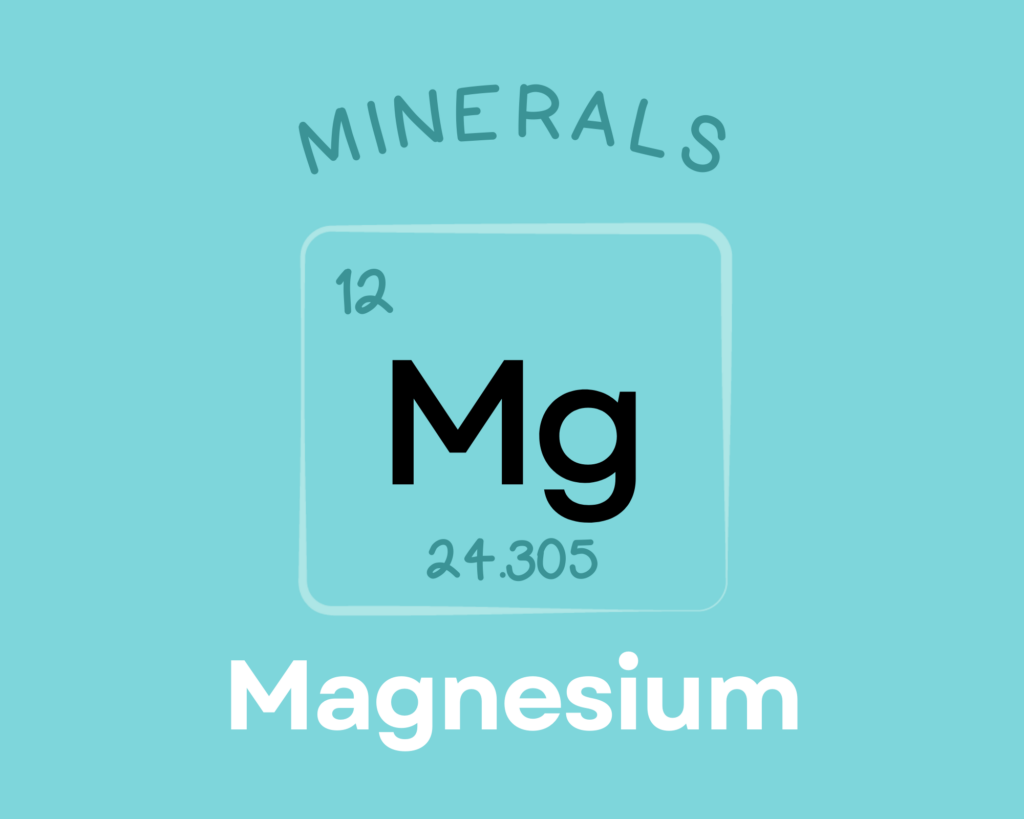
Magnesium is an essential mineral needed by every cell in the body. As an electrolyte, it’s important for regulating fluid balance, nerve and muscle function, blood pH, and neurotransmission. It also serves as a cofactor for hundreds of different enzymes, giving it a role over 300 metabolic reactions—including pathways for cell signaling, energy production, protein synthesis, nucleic acid synthesis, and ion transport. Magnesium also has important structural functions in cells and bone tissue. Consuming enough magnesium may help protect against a variety of chronic diseases, including cardiovascular disease, type 2 diabetes, and osteoporosis. Learn more about magnesium here.
Edamame Provides 20% DV Phosphorus
Edamame is an excellent source of phosphorus, providing 20% of the daily value per 1/2-cup serving!
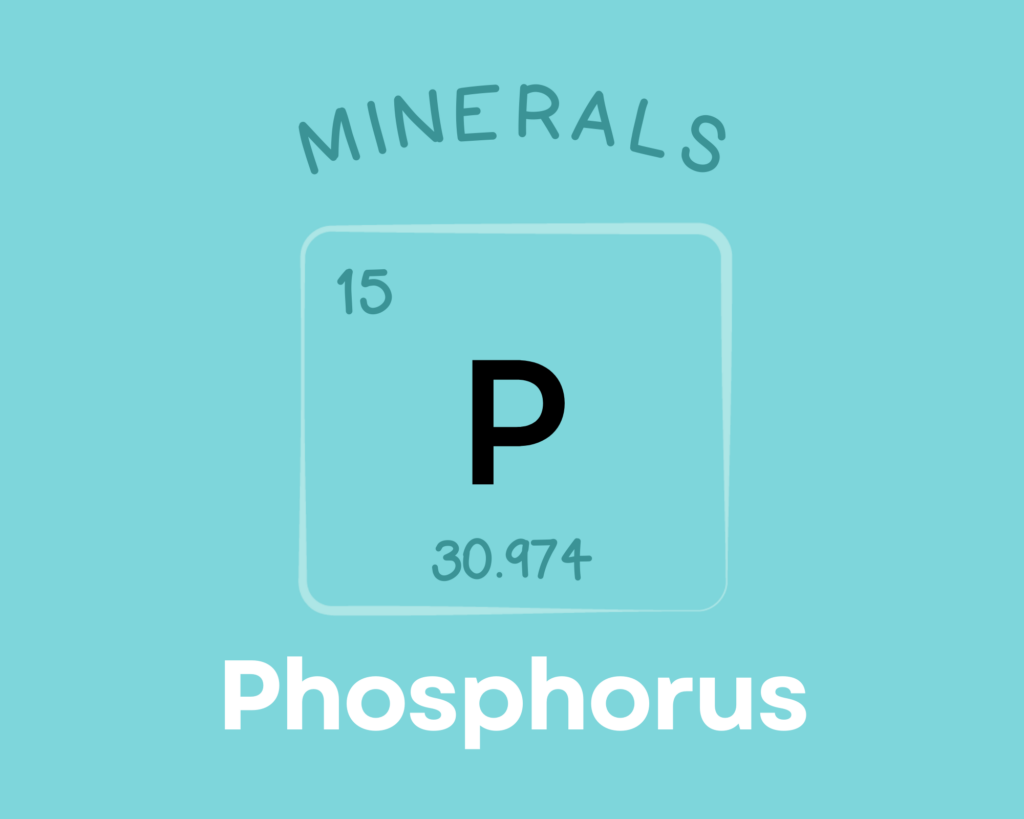
Phosphorus is an essential mineral that makes up about 1% of the total weight of the human body. Along with serving an important structural role for building nucleic acids and cell membranes, phosphorus is involved in numerous biological processes—including acid-base regulation, energy production, cell signaling, and bone mineralization. Excess phosphorus has been linked to a higher risk of cardiovascular disease, fractures, and osteoporosis, especially in the context of a low-calcium diet. Learn more about phosphorus here.
Want to know the top 500 most nutrient-dense foods?
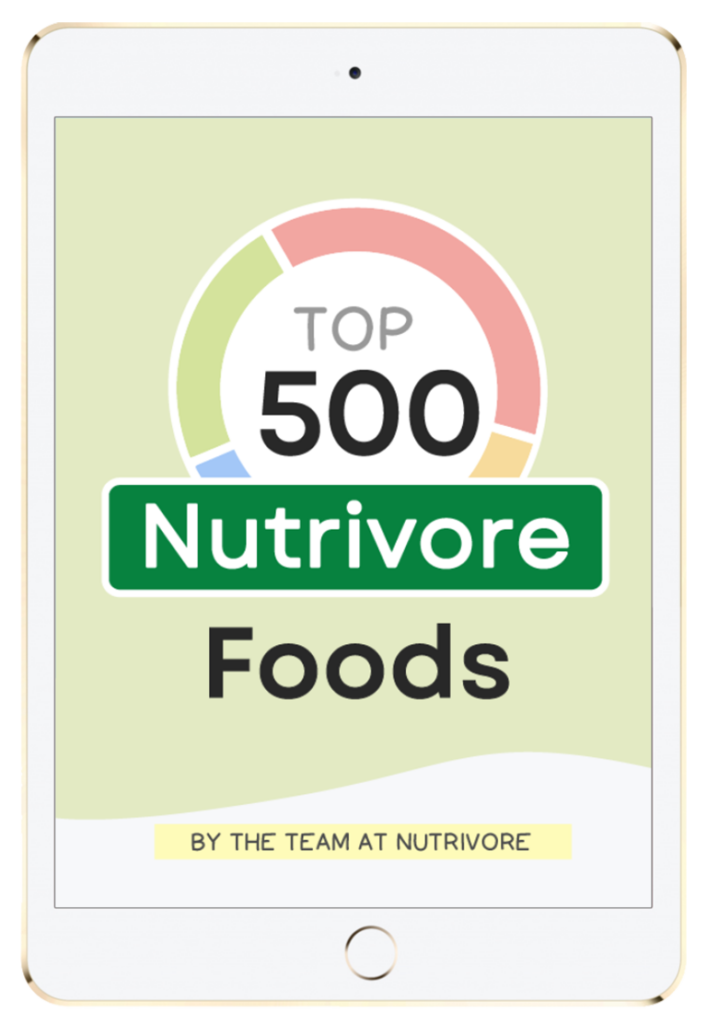
Top 500 Nutrivore Foods
The Top 500 Nutrivore Foods e-book is an amazing reference deck of the top 500 most nutrient-dense foods according to their Nutrivore Score. Think of it as the go-to resource for a super-nerd, to learn more and better understand which foods stand out, and why!
If you are looking for a quick-reference guide to help enhance your diet with nutrients, and dive into the details of your favorite foods, this book is your one-stop-shop!
Buy now for instant digital access.
How Much Edamame Should We Eat Per Day?
On average, legumes are the most nutrient-dense starchy plant foods we can choose to eat, thanks to their high fiber content and phytonutrients, all of which result in diverse health benefits!
In epidemiological studies, consumption of legumes is frequently associated with better health and greater longevity. This is attributable to their amazing nutrient-density (especially fiber, vitamins and minerals) and the fact that they’re particularly great for increasing growth of probiotic bacteria in our guts. Across studies, beans have demonstrated a great number of health benefits, likely due to their combination of fiber and phytonutrients. A high consumption of beans is associated with reduced waist size, lower risk of obesity, and lower systolic blood pressure.
A large 2017 meta-analysis showed that all-cause mortality (a general indicator of health and longevity) decreased by 16% with increasing intake of legumes up to 150 grams (3 servings) per day. And, in a 2021 study, eating 3+ servings of legumes per week reduces all-cause mortality by 17% compared to 2 servings per month. Learn more about legumes here.
Easily track your servings of Nutrivore Foundational Foods!
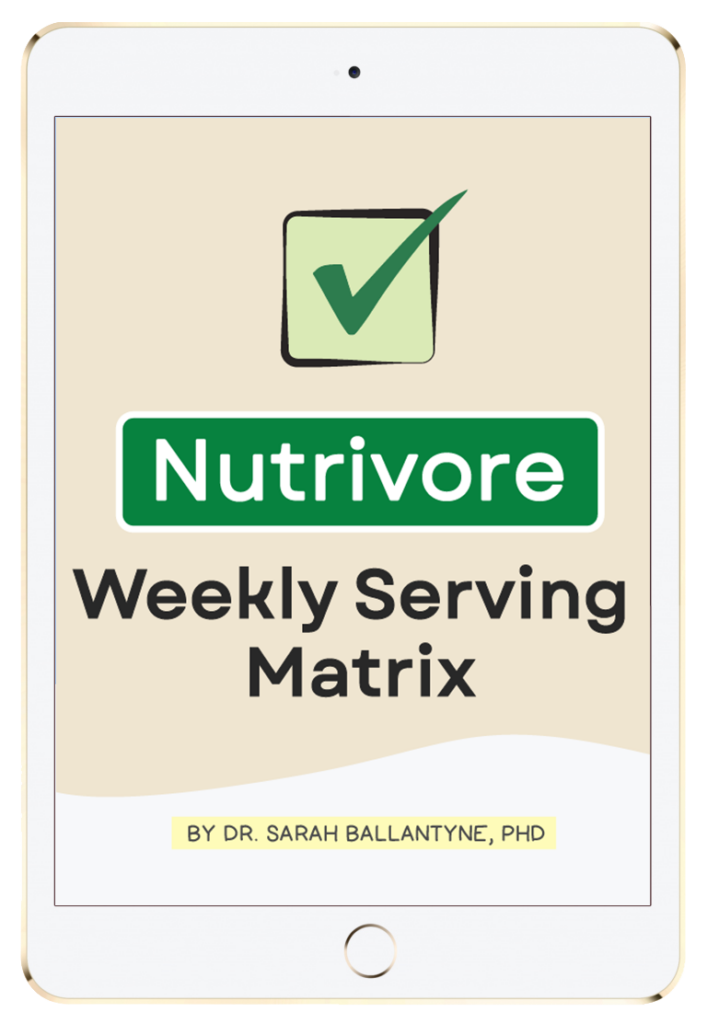
The Nutrivore Weekly Serving Matrix
The Nutrivore Weekly Serving Matrix digital resource is an easy-to-use and flexible weekly checklist designed to help you maximize nutrient-density and meet serving suggestions of Nutrivore foundational foods, all without having to weigh or measure your foods!
Includes a 22-page instructional guide and downloadable interactive guides.
Buy now for instant digital access.
cITATIONS
Expand to see all scientific references for this article.
Clements RS Jr, Darnell B. Myo-inositol content of common foods: development of a high-myo-inositol diet. Am J Clin Nutr. 1980 Sep;33(9):1954-67. doi: 10.1093/ajcn/33.9.1954. PMID: 7416064.
Phenol-Explorer: Soybean, edamame
Pravst I, Zmitek K, Zmitek J. Coenzyme Q10 contents in foods and fortification strategies. Crit Rev Food Sci Nutr. 2010 Apr;50(4):269-80. doi: 10.1080/10408390902773037. PMID: 20301015.
USDA Food Central Database: Soybeans, green, raw
USDA Food Central Database: Soybeans, mature seeds, raw
Watanabe T, Kioka M, Fukushima A, Morimoto M, Sawamura H. Biotin content table of select foods and biotin intake in Japanese. Int J Anal Bio-Sci. 2014. Vol 2(4):109-125.


